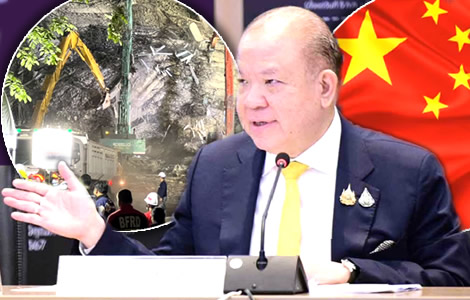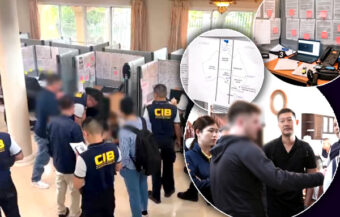Thai PM warns against singling out China as the government launches investigations into the Chatuchak building collapse. Focus is on the Chinese contractor and defective steel. Authorities probe 36 firms tied to major state contracts and growing concerns over Chinese networks
The Thai government appeared distinctly nervous this week about the direction of blame that is emerging relating to the Chatuchak building collapse. Indeed, the collapse of the 30-storey building being built by a joint venture has focused attention on the Chinese contractor China Railway Number 10 (Thailand) Co., Ltd and potentially defective Chinese-made steel. Indeed, the case company is growing. In turn, it is part of the China Railway Group (CREC), a massive Chinese state-owned behemoth that has been recently involved in a similar engineering debacle in Serbia. On Tuesday, however, Thai Prime Minister Paetongtarn Shinawatra warned that the government does not want China to think it is being singled out as answers are sought over the disaster. It comes as Minister of Commerce Pichai Naripthaphan on Thursday pressed ahead with a wide range of investigations targeted at two firms central to the matter.

Facing public pressure, Thailand has ordered multiple investigations into last Friday’s building collapse in Chatuchak. Certainly, both officials and police have initiated potential criminal probes into the disaster.
The 30-storey Auditor General Office crumbled on March 28. Indeed, the shocking scene was watched millions of times worldwide.
Any suggestion that Thailand had not suffered an earthquake were shattered by the collapse. Meanwhile, with at least 30 dead and score more expected, rescuers are working against time. They still hope to find survivors. Any success would lift the nation’s spirits.
Criminal inquiry expands as Thai officials probe 36 companies linked to major state contracts and projects
However, the disaster has created new problems for the government. This week, steel samples from the site were shown to be defective. As a result, attention has turned to Xin Ke Yuan Steel Co., Ltd. This is a Chinese-owned company that was established in Thailand in 2011. It invested ฿1.53 billion in the country.
Last December, Thai authorities shut down a steel plant run by this firm in Rayong. The closure followed a fire at the plant. At the same time, officials seized substandard steel worth ฿45 million.
After Friday’s collapse, the presence of Xin Ke Yuan steel on-site raised suspicions. Nevertheless, that company denies any wrongdoing. It claims its steel meets quality standards.
On Thursday, Minister of Commerce Pichai Naripthaphan and his deputy, Napinthorn Srisanpang, announced a large-scale investigation. The probe targets China Railway Number 10 (Thailand) Co., Ltd., founded in 2018, in addition to Xin Ke Yuan Steel Co., Ltd.
Government faces pressure as concerns grow over Chinese investments and dependence on Beijing
Thai officials will investigate 36 companies linked to 26 state contracts. Engineers are reviewing some projects, while others have already been revoked or abandoned.
Meanwhile, the Department of Special Investigation (DSI) has confirmed a criminal inquiry. The scale of the issue is enormous. China Railway Number 10 (Thailand) Co., Ltd. is tied to more than two dozen companies.
Although it is officially 51% Thai-owned, Chinese directors control it. Furthermore, it belongs to China Railway Group (CREC), a massive state-owned Chinese enterprise.
Significantly, this company was involved in a Serbian construction disaster in November 2024. There, its dual role also in railway projects was controversial and similar to Thailand.
On November 1, 16 people died when a concrete canopy collapsed at Novi Sad’s main railway station. The station had been renovated under China’s Belt and Road Initiative. Protests erupted in Serbia, raising concerns about Chinese-built infrastructure.
Advocacy groups warn of worker exploitation and safety breaches in Thailand’s booming construction industry
Back in Thailand, the government of Paetongtarn Shinawatra appears uneasy.
The focus of blame is shifting towards Chinese firms. Last week, both Deputy Prime Minister Anutin Charnvirakul and Prime Minister Paetongtarn Shinawatra called for broader accountability. The project’s architects and planners must also be investigated, they suggested.
On Tuesday, PM Paetongtarn warned against focusing on one country alone. She insisted on a full and fair inquiry. “We do not want one particular country to think we are only keeping eyes on it,” she stated.
This crisis highlights wider economic issues. Last year, China invested $2 billion in Thailand, making it the top foreign investor.
China also dominates Thai tourism, manufacturing, and exports. Meanwhile, the use of cheap steel at the Chatuchak site emphasises how low-cost imports are impacting Thai industry.
However, the government continues to be dependent on Chinese investment.
Furthermore, broader safety concerns have previously been raised by advocacy groups. The Migrant Working Group has documented worker complaints against Chinese companies in Thailand.
Roisai Wongsuban of the group told AFP, “For Chinese companies, we can’t see the human rights due diligence to check if labour standards are met. There is always a power imbalance between employer and employee.”
Thai investigators uncover vast network of firms linked to Chatuchak disaster, sparking deeper scrutiny of contracts
At the same time, Bangkok’s construction boom depends on migrant workers, mainly from Myanmar.
These labourers work in harsh conditions for low pay. The Migrant Working Group has urged the Thai labour ministry to hold employers accountable. If companies violated safety laws, they should face criminal charges.
Authorities have already arrested four Chinese nationals. They were caught attempting to remove documents from the collapse site. Undoubtedly, this has deepened suspicions.
Meanwhile, the Comptroller General’s Department will review 26 problematic projects. Some have been abandoned. If officials find irregularities, the companies involved may be blacklisted.
Additionally, Thai investigators have identified a network of over 37 firms tied to the collapsed building’s contractors. These findings have been handed to the DSI for further action.
Investigators uncover 37 firms linked to collapsed building as scrutiny on Chinese contractors intensifies
Meanwhile, the Thai Industrial Standards Institute (TISI) has begun inspecting the quality of construction materials. The Revenue Department is also reviewing the tax records of the linked firms.
Storm clouds gathering over Chinese firm at the centre of the collapsed Chatuchak building disaster
4 Chinese men nabbed by police as trying to remove 32 large files from the Chatuchak disaster site zone
Under Thailand’s Foreign Business Act of 1999, severe penalties apply to violators. Those acting as nominees for foreign investors face up to three years in prison or fines between ฿100,000 and ฿1,000,000. Foreign firms found guilty of illegal operations may be forced to shut down or surrender their holdings.
This scandal has revealed deeper concerns about Chinese infrastructure projects in Thailand. Lax safety enforcement is now under scrutiny. As the investigation continues, the Thai government faces tough questions over its reliance on China and its connections to the Communist country.
Join the Thai News forum, follow Thai Examiner on Facebook here
Receive all our stories as they come out on Telegram here
Follow Thai Examiner here
Further reading:
Storm clouds gathering over Chinese firm at the centre of the collapsed Chatuchak building disaster
US scan shows 50-60 human beings said to be in a hallway within the collapsed Chatuchak building
People’s Party on campaign but on guard against potential legal complaints to oversight agencies
Wealthy young People’s Party leader aims to create a technology-driven and efficient welfare state
Inward immigration may ultimately be the only thing that can halt Thailand’s fated economic decline


















